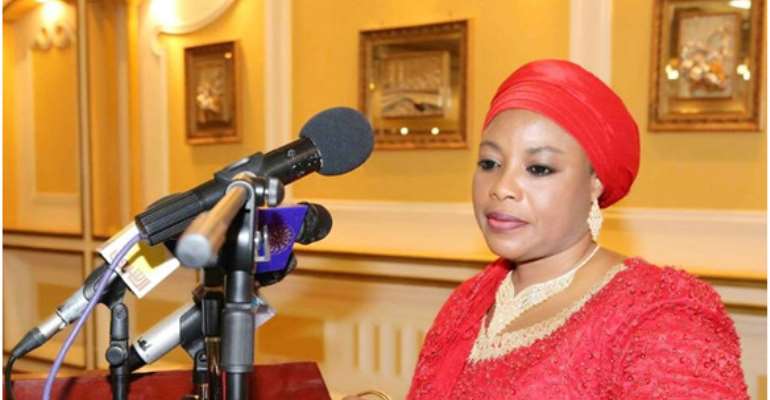A Memorandum On The Position Of Apc Women In The Ongoing Discourse On ‘true Federalism

A MEMORANDUM ON THE POSITION OF APC WOMEN IN THE ONGOING DISCOURSE ON ‘TRUE FEDERALISM’ PRESENTED BY THE NATIONAL WOMAN LEADER OF THE APC, HAJIYA DR. RAMATU TIJJANI ALIYU ON THE 18TH OF OCTOBER 2017
ALL PROTOCOLS OBSERVED:
The lot of the Nigerian woman is not at all enviable. They are hardly considered, when making far-reaching decisions of national proportion, yet they often bear the brunt of the consequences of our failings.
Thepopular narrativein Nigeria today is that our federation is unbalanced and needs to be rejigged.That despitebeingblessed with vast natural (andhuman) resources, Nigeria is not delivering public goods to the generality of Nigerians. This webelieve has spurred the clamour for ‘restructuring’ across the country.
As most of us will agree, there is a distinct need for devolution of power from the center to the federating units. Afew items on the exclusive legislative list should be transferred to the concurrent list to fast-trackthe development of the country and enhance delivery of essential services to the Nigerian people.Some of the thingswe believe can benefit from this ‘reshuffling’ include but are not limited torailway, limited provision for state/community police, andprisons. And at this point, it’ll also not be out of place to transfer the so-called federal roads and other similar infrastructure to the states for optimum utility.
Logically, for the states to take on such additional responsibilities they will need to access a commensurateshare of the National wealth to so do. Thisin turn highlights the imperative of resolving the issue of fiscal federalism and/or derivation principle. We believe that by putting Nigeria first, this question can be tackled in harmony rather than acrimony.
On the issue of the Ideal federating units to adopt and if there should be a merger or creation of more states, it is our considered opinion that the status quo should be maintained. A return to the regional government format is not feasible for so many reasons well known to all of us and if forced on Nigerians will only fan the embers of minority suspicion and oppression. On the other hand, so many of the states in the Federation as presently constituted are not economically viable and largely rely on allocations from the centre to even barely afford to pay the salaries of workers. Creating more states is tantamount to creating more problems for Nigeria and its people.
And then there are other contentious issues that sharply divide opinion,like if Nigeria should operate a presidential or parliamentary system of government, unicameral or bicameral legislature, citizenship/indigene-shipconundrum, the efficacy and legitimacy of the current land tenure system, and even the muted idea of a rotational presidency under our law.
Our position is that each of these options have their pitfalls and as such Nigeria must adopt a mix that best suits our national reality and peculiarity. For instance, even if it is widely believed that the Presidential system encourages waste and is too expensive to run, it is also argued that the parliamentary system in Nigeria wasnot exactly successful in the past and that it encourages sectionalism;seeing as Nigeria is anything but a homogeneous Nation.
However, what is clear to us is that the present land tenure system needs to be revisited to make access to land for agriculture and development easier for the average Nigerian. The widespread practice in most Nigerian communities of discriminating against people inthe name of ‘indigenes’ and‘settlers’ must be consignedto the dustbin of illegality by a conscious legislation and implementation of well thought policies. What should matter in our nation is where you reside and pay your taxes, not your ‘state of origin’. This will enable EVERY NIGERIAN IRRESPECTIVE OF WHERE YOU ARE FROM OR WHERE YOU LIVE to enjoy the full set of rights and benefits guaranteed under our laws. This will in turn enthrone a sense of inclusion and fair play which are necessary ingredients in nation building.
On a final note, let me re-echo the sentiment of Nigerian women,particularly the APC women to the effect that most Nigeriansvaluethelimitless opportunitiesour ‘unity in diversity’ offers. As our President aptly noted, Nigeria’s unity is not ‘negotiable’. Andlike we all acknowledge;the imperative of a more egalitarianand equitable Nigeria is not lost on us. We are hopeful that a more united and prosperous Nigeria will emerge from this exercise.
THANK YOU FOR LISTENING.
